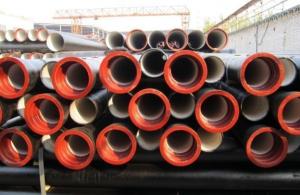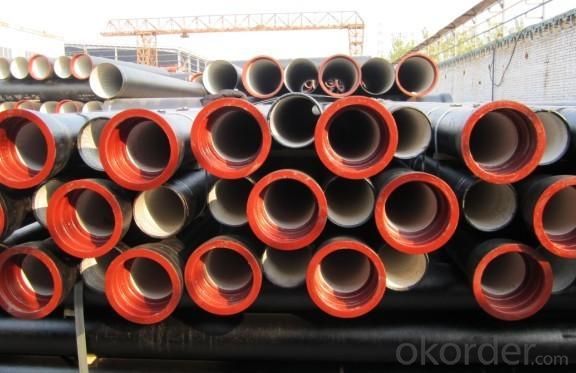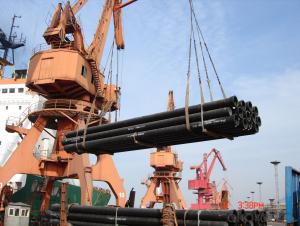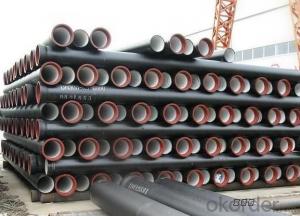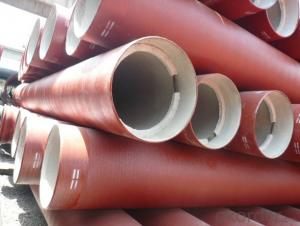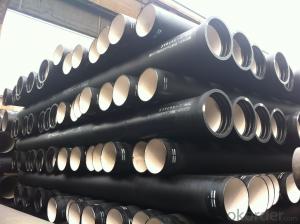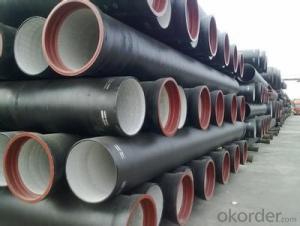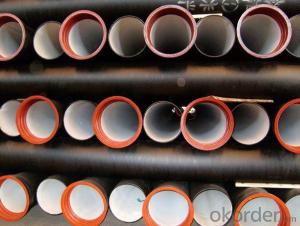Ductile Iron Pipe DN300 EN545 / EN598 / ISO2531
- Loading Port:
- China main port
- Payment Terms:
- TT or LC
- Min Order Qty:
- 20 m.t.
- Supply Capability:
- 200000 m.t./month
OKorder Service Pledge
OKorder Financial Service
You Might Also Like
1.Ductile Iron Pipe Description :
DI pipe fittings are manufactured according to ISO 2531 or BS EN545 or BS4772 FOR POTABLE WATER ,internal is cement lining or wet epoxy coating;External is zinc plus bitumen or wet epoxy coating. We also manufacture ductile iron fittings with fusion bonded epoxy both inside and outside. All the producets are sutible to water pipes fields.
We have passed ISO9001,ISO14001,OHSMS18001 certificate.
2.Main Features of the Ductile Iron Pipe:
•High yield strength
•High tensile Strength
•High corrosion resistance
•Pressure Resistence
•Anti-corrosion
•Installation is convenient
•Satisfy the highest hygienic standards
3.Ductile Iron Pipe Images:
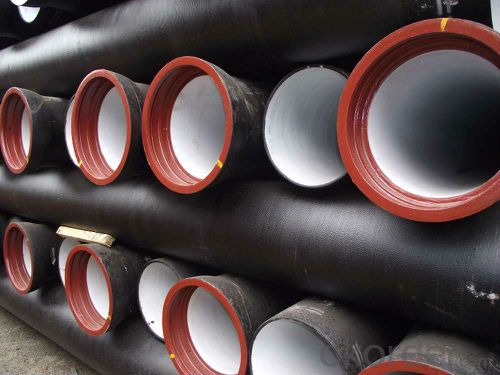
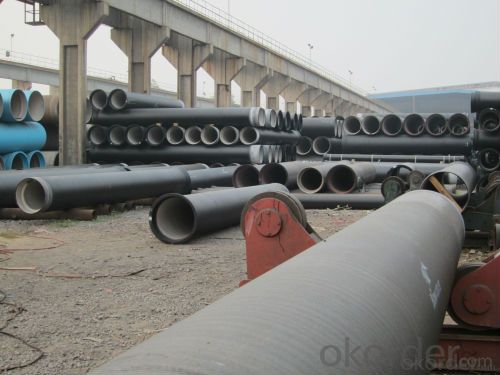
4.Ductile Iron Pipe Specification:
Standard: API SPEC 5L 44th eidtion,ASTM A252-98(2007)
Grade: A53 Grades A/B, ASTM A106 Grades B/C,ASTM A179
AWWA, C200, ASTM A139, ASTM A120, API 5L Grade B
X42, X52, X56, X60, X65, X70, X80, X100
Weld Alternatives: LSAW
OD size range: 6.4~44.5mm
Wall thickness: 406.4~1422mm
Length: 3 - 12 m according to requirment
Note: Other grade can also be provided after consulting. Special design are available for coal slurry conveyance LSAW line tube -- Service
5.FAQ:
We have organized several common questions for our clients,may help you sincerely:
1.Q: Why would you choose ductile iron pipe rather than other pipe materials?
A:The reasons are obvious for that not only ductile iron pipe possesses the inherent strength and flexibility of ductile
iron, combined with proven corrosion protection systems, but also the cost savings can be achieved from design to
installation and commissioning.
2.Q:Why can you guarantee the inner of pipes can’t be corroded?
A: High alumina cement mortar lining and sulphate-resistant cement mortar lining. These two special linings are applicable
to inner anti-corrosion for sewage pipes, improving resistance to erosion of the sewage components.
- Q: How are ductile iron pipes protected against mechanical damage?
- Ductile iron pipes are protected against mechanical damage through various measures. One common method is the application of protective coatings on the external surface of the pipe. These coatings, such as epoxy or polyethylene, provide a barrier against abrasion and impact, reducing the risk of mechanical damage. Additionally, ductile iron pipes are often installed with proper bedding and backfill materials, ensuring a stable and supportive environment that minimizes the potential for external forces to cause damage. Furthermore, the pipes can be designed with thicker walls or ribs to enhance their resistance to mechanical stress. Overall, a combination of protective coatings, appropriate installation techniques, and structural design considerations helps safeguard ductile iron pipes against mechanical damage.
- Q: Can ductile iron pipes be used in nuclear power plants?
- Ductile iron pipes are suitable for use in nuclear power plants due to their improved flexibility and strength compared to traditional cast iron pipes. They are known for their durability, resistance to corrosion, and ability to withstand high pressure and temperature conditions. These pipes are a reliable and robust choice for transporting water, coolant, and other fluids in nuclear power plants. However, it is crucial to consider the specific requirements and regulations of each power plant before selecting the pipe material. It is necessary to ensure proper testing, certification, and compliance with nuclear industry standards to guarantee the safe and efficient operation of the power plant.
- Q: How are ductile iron pipes installed?
- Ductile iron pipes are typically installed using the following method. First, the trench is excavated to the required depth and width. The bottom of the trench is then carefully leveled and compacted to provide a stable foundation. Next, a bedding material, usually a sand and gravel mixture, is placed at the bottom of the trench. This bedding material helps to support the pipe and distribute the load evenly. It also serves to protect the pipe from any sharp objects that may be present in the soil. Once the bedding is prepared, the ductile iron pipes are carefully lowered into the trench and aligned to the desired position. It is important to ensure that the pipes are properly aligned and have the correct slope for efficient water flow. After the pipes are in place, they are joined together using a mechanical joint or a push-on joint system. These joints are designed to provide a secure and leak-free connection between the pipes. The joints are typically sealed using rubber gaskets, which help to create a watertight seal. Once the pipes are joined, the trench is backfilled with the excavated soil, taking care to compact it in layers to prevent settlement. The backfilling process is usually done in stages to allow for proper compaction. Finally, the installation is completed by connecting the ductile iron pipes to the existing water supply system or other pipes using appropriate fittings and valves. Pressure testing may also be carried out to ensure the integrity of the installation. Overall, the installation of ductile iron pipes requires careful planning, proper alignment, and secure jointing to ensure a long-lasting and reliable water supply system.
- Q: QT400-10 nodular cast iron requires hardness of HRC47~51. Why can't quench hardness be reached?
- Quenching temperature: when the silicon content of nodular cast iron is 2.0-3.0%, the quenching temperature is 860-900 DEG C, the silicon content is low, and the upper limit is taken when the lower limit is high.2. holding time: because of the consideration of diffusion graphite cast iron, alloy steel is therefore the holding time, holding time longer than carbon steel.3. oil quenching.
- Q: Can ductile iron pipes be used for trench crossings?
- Yes, ductile iron pipes can be used for trench crossings. Ductile iron pipes are known for their high strength and durability, making them suitable for various applications including trench crossings. They have the ability to withstand heavy loads and provide increased resistance to external forces, making them a reliable choice for such purposes.
- Q: What are the advantages of using ductile iron pipes?
- There are several advantages of using ductile iron pipes in various applications. Firstly, ductile iron pipes have a high strength-to-weight ratio, making them a cost-effective choice for transporting fluids or gases. They can withstand high internal and external pressures, ensuring reliable and efficient transportation of materials. Secondly, ductile iron pipes have excellent corrosion resistance. They are resistant to rust and other forms of corrosion, which extends their lifespan and reduces maintenance costs. This makes them suitable for underground and underwater applications where corrosive elements are present. Additionally, ductile iron pipes have superior ductility, meaning they can withstand heavy external loads and impacts without cracking or breaking. This makes them less susceptible to damage during installation or when exposed to harsh environmental conditions. Moreover, ductile iron pipes have excellent flow characteristics. Their smooth inner surface minimizes friction and pressure losses, resulting in efficient fluid flow and reduced pumping costs. This is especially advantageous in applications where high flow rates or long-distance transportation is required. Furthermore, ductile iron pipes are environmentally friendly. They are made from recycled materials and can be recycled themselves, reducing the demand for raw materials and minimizing environmental impact. Additionally, their long service life minimizes the need for frequent replacements, further reducing waste generation. Lastly, ductile iron pipes have versatile installation options. They can be installed using various techniques such as trenchless methods, which minimize disruption to the surrounding environment and reduce installation costs. Their adaptability and ease of installation make them a preferred choice for various construction projects. Overall, the advantages of using ductile iron pipes include their high strength, corrosion resistance, ductility, flow characteristics, environmental friendliness, and versatile installation options. These factors make them a reliable and cost-effective choice for numerous applications in various industries.
- Q: What's the difference between grey cast iron pipe and ductile iron pipe?
- Ductile iron is close to medium carbon steel and is much cheaper. Vermicular graphite iron is the best, but grey iron is worse and white iron is the worst. Therefore, the quality of ductile iron pipe with better quality and price is superior to other cast iron pipe fittings.
- Q: How does ductile iron pipe compare to steel pipe in terms of durability?
- Ductile iron pipe and steel pipe both have their own unique characteristics, but in terms of durability, ductile iron pipe has several advantages over steel pipe. Firstly, ductile iron pipe is highly resistant to corrosion. It has a protective layer of zinc or cement lining that prevents rust and corrosion, making it more durable and less prone to leaks or failures. On the other hand, steel pipe is susceptible to corrosion, especially when exposed to moisture or certain chemicals. This can lead to structural issues and decrease its overall durability. Secondly, ductile iron pipe has excellent impact resistance. It can withstand heavy loads and external pressures without cracking or breaking. This makes it suitable for applications in areas with high traffic or where the pipe may be subject to accidental impacts. Steel pipe, although strong, can be more brittle and prone to fractures under similar conditions. Additionally, ductile iron pipe has a longer service life compared to steel pipe. It has been known to last for over 100 years with proper maintenance, making it a reliable and durable choice for infrastructure projects. Steel pipe, while still durable, may require more frequent inspections and maintenance to ensure its longevity. Overall, ductile iron pipe surpasses steel pipe in terms of durability due to its corrosion resistance, impact resistance, and longer service life. However, the choice between the two ultimately depends on the specific application, budget, and other project requirements.
- Q: What is the minimum operating temperature for ductile iron pipes?
- Ductile iron pipes typically have a minimum operating temperature of -40 degrees Celsius, showcasing its exceptional strength and ductility in cold conditions. This makes it a versatile option for various purposes, such as water and wastewater systems. Nevertheless, it is crucial to acknowledge that the specific minimum operating temperature may differ based on factors such as the grade of ductile iron employed and the requirements of the application. It is highly advisable to refer to the manufacturer's specifications and guidelines for the appropriate utilization and optimal performance of ductile iron pipes in cold temperatures.
- Q: How are ductile iron pipes connected together?
- Ductile iron pipes are typically connected together using a variety of methods, depending on the specific application and requirements. The most common method of connecting ductile iron pipes is through mechanical joint fittings. These fittings consist of a bell end on one pipe and a spigot end on the other, which are joined together using a rubber gasket and bolts or clamps. The rubber gasket provides a watertight seal, while the bolts or clamps secure the joint and prevent any movement or separation. Another method of connecting ductile iron pipes is through flanged joints. Flanged joints involve attaching a flange to the end of each pipe, which are then bolted together using bolts and nuts. This method is commonly used in larger diameter pipes or in situations where the pipes need to be easily disassembled. In addition to mechanical joint fittings and flanged joints, ductile iron pipes can also be connected using push-on or restrained joint fittings. Push-on joints utilize a rubber gasket that is pushed onto the spigot end of the pipe, creating a secure and watertight connection. Restrained joints, on the other hand, incorporate additional features such as welded-on collars or mechanical devices to prevent movement and provide added strength to the joint. Overall, the method of connecting ductile iron pipes together depends on factors such as pipe diameter, pressure requirements, and the specific application. It is important to follow the manufacturer's guidelines and industry standards to ensure proper installation and reliable performance of the connected pipes.
Send your message to us
Ductile Iron Pipe DN300 EN545 / EN598 / ISO2531
- Loading Port:
- China main port
- Payment Terms:
- TT or LC
- Min Order Qty:
- 20 m.t.
- Supply Capability:
- 200000 m.t./month
OKorder Service Pledge
OKorder Financial Service
Similar products
Hot products
Hot Searches
Related keywords
